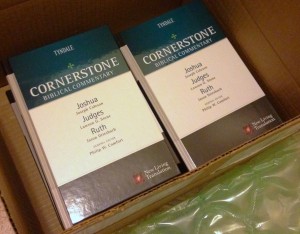In this category of posts, which I’m calling “Notes and Comments,” I will post excerpts from my recently published commentary on the book of Judges in the Cornerstone Biblical  Commentary series, published by Tyndale House and using the New Living Translation as the English text of reference. While writing this commentary, I often started at the beginning and read straight-through to see how it would feel to the reader, since I wanted it to be more than just an encyclopedia-type work. Much of the commentary was shaped by time spent in Israel with students; and I’ll let you guess which sections bear the impress of that experience the most! So in this area of the blog, I’ll share with you several sections of the commentary that came from fresh moments of insight, or which I simply enjoyed writing and hope you enjoy reading and even find profitable in your own understanding of scripture.
Commentary series, published by Tyndale House and using the New Living Translation as the English text of reference. While writing this commentary, I often started at the beginning and read straight-through to see how it would feel to the reader, since I wanted it to be more than just an encyclopedia-type work. Much of the commentary was shaped by time spent in Israel with students; and I’ll let you guess which sections bear the impress of that experience the most! So in this area of the blog, I’ll share with you several sections of the commentary that came from fresh moments of insight, or which I simply enjoyed writing and hope you enjoy reading and even find profitable in your own understanding of scripture.
____________
THE BOOK OF JUDGES provides some of the most memorable stories in the Bible. The stories of Gideon and Samson have entertained and inspired generations. Paradoxically, the very qualities that give the book its appeal also make it one of the most troubling in all  of Scripture. Gideon’s heroics are accompanied by a darker, vengeful side. Samson’s victories against the Philistines never fully distract the reader from his personal foibles and ultimate tragedy. Ehud seems a tricky assassin, not a divinely empowered “savior,” and the story of Jephthah seems to enclose an obscenity within a horror. The gruesome narrative with which the book of Judges ends offers little opening for an edifying theological or spiritual interpretation.
of Scripture. Gideon’s heroics are accompanied by a darker, vengeful side. Samson’s victories against the Philistines never fully distract the reader from his personal foibles and ultimate tragedy. Ehud seems a tricky assassin, not a divinely empowered “savior,” and the story of Jephthah seems to enclose an obscenity within a horror. The gruesome narrative with which the book of Judges ends offers little opening for an edifying theological or spiritual interpretation.
More than any other book of the Bible, the book of Judges puts before the reader the issue of violence. Its major characters are all persons who perform acts of violence, sometimes heroic, other times horrific. A Dodge City feeling pervades the book, and one almost expects Clint Eastwood to be among its characters. Most notably  the violence is visited upon women, such as Jephthah’s daughter, Samson’s first wife, the Levite’s concubine, and the virgins of Shiloh. But Violence is also wrought by women such as Jael and Delilah, and even celebrated by women like Deborah and, in her own blind way, Sisera’s mother.
the violence is visited upon women, such as Jephthah’s daughter, Samson’s first wife, the Levite’s concubine, and the virgins of Shiloh. But Violence is also wrought by women such as Jael and Delilah, and even celebrated by women like Deborah and, in her own blind way, Sisera’s mother.
And yet, somehow the book’s presentation of violence, even at times with approval, does not finally encourage the reader to perpetrate violence. The book’s celebration of heroic individuals who tower over ordinary Israelites, the victims, does not point toward an unbridled individualistic ethos for the community. Rather, the prowess of individuals is celebrated as an expression of Yahweh’s faithfulness to his people. Indeed, Judges seems concerned to harness the energies of its restless subject matter—oppressors, liberators, villains and heroes, assassins, gangsters, whores, and tricksters—to point the reader to a larger vision of the community and kingdom toward which Yahweh is leading his people.




One Response